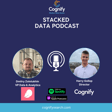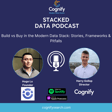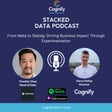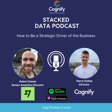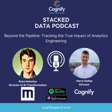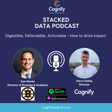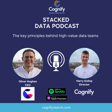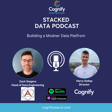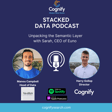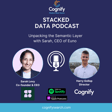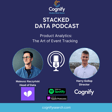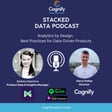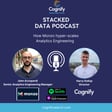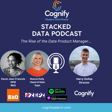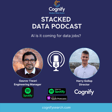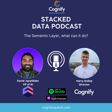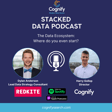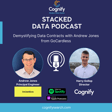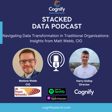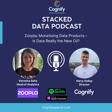
005 - Data-Driven Sustainability: Unlocking the Power of Carbon Analytics
🌱 Our planet is getting warmer, and the undeniable impact of climate change is a stark reminder that we all need to take action. But as individuals, it's easy to feel powerless in the face of such a monumental challenge. That's where modern data teams come in, with the potential to drive positive change and make businesses greener and more efficient.
🎙 In our latest episode of the The Stacked Data Podcast, we dive headfirst into the world of Carbon Analytics, a space filled with untapped potential. Join me as I sit down with the passionate advocate for sustainability, Nina Anderson from Infinite Lambda. Nina is on a mission to empower data professionals and shed light on the transformative power of Carbon Analytics.
Why Carbon Analytics? The Essential Business Imperative
You might be wondering, "Why does Carbon Analytics matter for my business?" Nina breaks it down for us in this insightful episode, outlining key reasons why it's no longer a luxury but an essential:
0️⃣ NET ZERO Targets: As the world races towards carbon neutrality, understanding your environmental impact is crucial to achieving NET ZERO targets.
📜 Regulation Change: Regulations around carbon emissions are evolving rapidly. Being prepared is not just advisable; it's necessary.
💸 Cost Reduction: Carbon Analytics can uncover hidden efficiencies and cost-saving opportunities in your operations.
💰 Competitive Advantage: Sustainability is a competitive differentiator. Embrace Carbon Analytics to stay ahead of the curve.
😇 Customer Satisfaction: Modern consumers favor businesses that prioritize sustainability. Happy customers mean better business.
We also explore practical examples of how you can leverage your own modern data stack to start generating actionable insights.
Did you know that the National Grid provides detailed data on the carbon intensity of electricity across regions? When combined in your Data Warehouse with your electricity consumption, you can quickly assess your carbon impact. Surface this in your BI tool per sale and you might be able to start shifting a culture! ⚡
A Wealth of Insight for Sustainability Advocates
This episode is full of knowledge about an emerging and important space. If you're passionate about sustainability and committed to making a positive impact, this is an episode you can't afford to miss.
